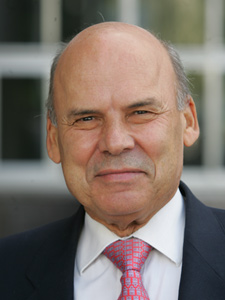Luis Herrera, Full Professor emeritus Environmental Biology of the University of Navarra
Natural extinction?
 Species extinctions can be considered a natural phenomenon or, on the contrary, an event derived from human activity. However, the intensity of species extinctions has varied over time, ranging from relatively low extinctions over long periods of time - "background extinctions" - to relatively high declines over short periods of time - "mass extinctions" - fees .
Species extinctions can be considered a natural phenomenon or, on the contrary, an event derived from human activity. However, the intensity of species extinctions has varied over time, ranging from relatively low extinctions over long periods of time - "background extinctions" - to relatively high declines over short periods of time - "mass extinctions" - fees .
Mass extinctions occur due to natural catastrophic phenomena -such as volcanic eruptions, earthquakes, or meteorite impacts- that abruptly modify environmental conditions. As a consequence, there is a loss of biodiversity with the disappearance of numerous species unable to adapt to the new environmental conditions. This happened in different geological periods such as the Ordovician, Permian or Cretaceous. Likewise, after each mass extinction, the extinct species were naturally replaced by new ones. For example, placental mammals (which have a placenta in which their young develop) occupied the niches of extinct saurians, after which biodiversity levels could recover and even increase.
But the loss of biodiversity that we are witnessing today may be a completely new phenomenon. A fact around which there is a real battle of numbers about the species that are disappearing. It is also suggested that the loss of biodiversity may be linked to the destruction of habitats due to the increase in agricultural land, the sealing of soils as a result of population growth and industry, the use of poisons and pesticides, or excessive hunting and fishing.
A recent scientific work on birds, carried out in 114 countries, calculated that one species becomes extinct every year. That is, according to this work the rate of bird disappearance is about ten times higher than the natural rate (0.1). However, other authors consider that the extinction rate reaches 10 bird species per year, which would be about 100 times the natural rate. Whether it is due to human action or not, what can be concluded from scientific works such as the one mentioned above is that there is currently an extinction rate higher than the natural rate.
This was also made clear at a seminar held a few days ago at the Vatican and graduate "Biological Extinction. How to save the natural environment on which we depend", promoted by the Pontifical Academy of Sciences and the Pontifical Academy of Social Sciences and which included renowned scientists such as Nobel Prize winner Werner Arber. In this meeting the experts concluded that, based on the comparison of fossil documentation, "the loss of species is approximately one thousand times that of the historical percentage". "At present," they stressed, "a quarter of the species would be in danger of extinction and half of them could disappear by the end of the century."
Today we know with certainty that the functioning of the planet's ecosystems depends on the conservation of biodiversity. Food, natural resources, many medicines, the absorption of waste or the balance of the climate, not to mention much of the beauty of this world, are due to the natural wealth of species and their varieties. In this regard, the experts gathered at the Vatican recalled that "we know less than one-fifth of the species that populate the world. Therefore, we are losing an unknown potential and endangering the fundamental mechanism of our Planet".
As these scientists explained, "before the development of agriculture, about 10,000 years ago, humans lived in groups of a few dozen individuals, for whom survival was an enormous challenge. Gradually, a third of the land was used for agriculture". In spite of this, "when the training of intensive farming systems in appropriate regions is done correctly - with crop rotation, incorporation of livestock and reinvestment in regional economies - it becomes a strategy for the protection of biodiversity".
In any case, this seminar confirmed that the maintenance of biodiversity will only be possible if we work together to build a sustainable, stable world based on social justice, as was already made clear in the encyclical Laudato Si, promoted by Pope Francis.
